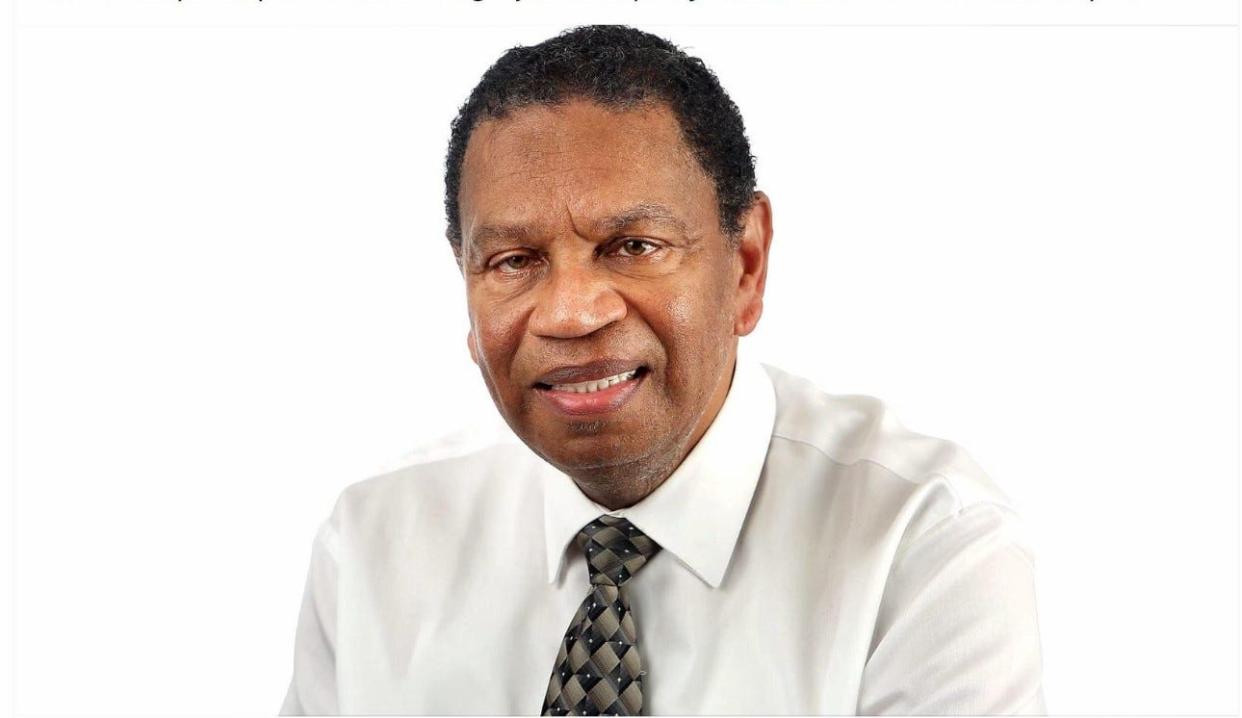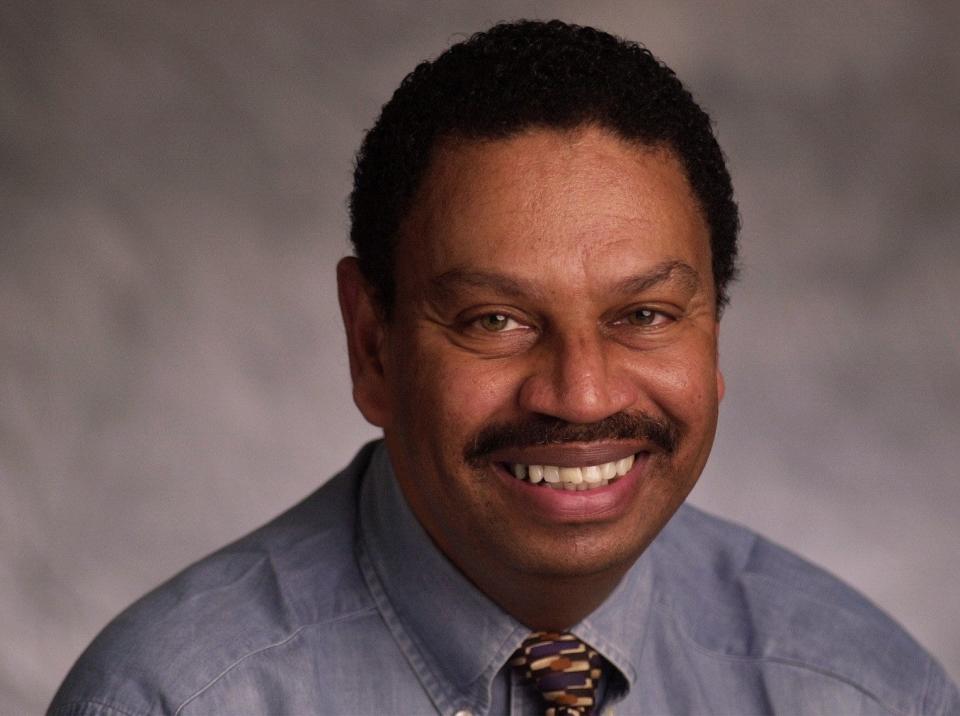Jerome Wright dies at 74: Veteran journalist had 'passion' for news and Memphis

- Oops!Something went wrong.Please try again later.
- Oops!Something went wrong.Please try again later.
Jerome Wright had a passion for his Memphis hometown and a devotion to the watchdog mission of journalism that never wavered in close to 50 years as a reporter and editor at The Commercial Appeal, colleagues and even occasional adversaries said Tuesday.
According to those who knew him, Wright considered journalism in general and newspaper reporting in particular to be almost sacred callings — undertakings intended to safeguard citizens by insisting on honesty and integrity from government, law enforcement and other institutions.
"I was in that newsroom for 38 years and knew an awful lot of people that were really dedicated to community journalism and the idea that we made Memphis a better place, and I don't know of anybody that believed it more or was more passionate about it than Jerome," said Louis Graham, 66, former editor of The Commercial Appeal.
"Jerome probably spent more time in my office than he did in the press room," said E. Winslow "Buddy" Chapman, police director during the administration of Mayor Wyeth Chandler, remembering how he and police reporter Wright sometimes butted heads over various stories.
Wright, 74, died late Monday night of natural causes at his Whitehaven home, according to family members.
In a statement Tuesday, Congressman Steve Cohen called Wright "a beloved fixture" of the Memphis news community.
Wright's "farewell column" at The Commercial Appeal was published April 2, 2017 — a date that marked a tenure of "45 years, 7 months and 16 days" at the newspaper, he wrote, with his trademark insistence on factual precision.
Said Cohen: "Jerome was old school and called balls and strikes, knew the players and the history — the kind of journalist Memphis and our nation needs more of."
'He was always a man of integrity'
A lifelong Memphian who grew up in Binghampton and South Memphis, Wright began as a copy clerk in 1971 while a student at what was then called Memphis State University, when "the newspaper was in a former Ford Motor Co. assembly plant," with "black rotary dial phones and Remington typewriters." (The old Union Avenue building was replaced by new headquarters in 1977; in 2019, the newspaper moved Downtown, about a mile west.)
In the following decades, Wright — who earned his bachelor's degree in 1972 — occupied many different chairs in the newsroom, with lengthy, notable stints as police reporter; Deputy Metro Editor; editor and overseer of the "Neighbors" and DeSoto County sections; and, finally, Editorial Page Editor.
"We were a newspaper juggernaut, putting out eight editions a night, with reporters stationed all over the Mid-South," Wright wrote.
An integral cog in that juggernaut, Wright covered many of the most harrowing and explosive stories of his era. For example, as a newly appointed deputy editor, he guided coverage of the "Shannon Street massacre" of 1983, when police stormed a house and killed seven so-called cultists after the beating death of an officer.
But Wright could mine the crime beat for offbeat as well as tragic news. "A midtown lounge operator stuck his neck out yesterday to help police crack what may be the city's first ostrich-napping" began a 1977 story about thieves who stole a pair of 5-foot-tall birds from the Memphis Zoo.
“What the media and specifically Jerome and the local newspaper meant to me was a check and a balance on decisions I made,” said Chapman, 84. “Despite the fact that they wrote some bad things about me, they represented a very valuable resource for a person in public life, if you would allow them to be. Jerome asked some very pointed questions, but he was always a man of integrity.”
One of the 'three amigos' at The CA
Mayhem and malfeasance aside, Wright always was eager to celebrate the positive aspects of Memphis and the Mid-South, especially during his tenure as editor of the newspaper's "Neighbors" sections.
“Jerome knew every community by name in this town, and he would really get upset if somebody put a street in the wrong neighborhood,” said political commentator Otis Sanford, 70, professor emeritus in journalism at the University of Memphis and a former longtime reporter/editor at The Commercial Appeal. “He’d come back and say, ‘That wasn’t Castalia Heights, it was Glenview.’ He knew everything about the communities.”
Sanford said that for a time in the late 1970s and early 1980s, he covered federal courts; Karanja Ajanaku (then known as Leroy Williams Jr.) covered city hall; and Wright covered police. So The Commercial Appeal fielded what was perhaps a "groundbreaking" team of Black reporters on "the essential justice and government beats," he said.

Willie W. Herenton — the former city schools superintendent who was mayor of Memphis from 1992 to 2009 — said this made an impression.
“I was covered by so many reporters, but I remember Jerome Wright because he was among the very first group of Black journalists at The Commercial Appeal, and maybe among the first at a major newspaper,” said Herenton, 83. "I always respected him."
"For the lack of a better term, we were the three amigos down there," said Sanford, referring to his tenure alongside Wright and Ajanaku. "All three of us were in agreement with each other that we would know everything there was to know about our respective beats, that nobody would beat our coverage and we made a real effort to do that to the best of our abilities."
Not that it was all hardnosed newshounding. "A lot of times we would forego eating lunch and spend our lunch hour in a dusty old pool hall Downtown called People's," on North Second.
Graham said Wright particularly "adored" being editorial-and-opinions editor because “It put him right in the middle,” with politicians, activists, faith leaders and “all the people who were making the conversation of the day."
In his farewell column, Wright remarked: "It's personally disappointing that so many politicians refuse to see the value of making investments on the front end to mitigate social ills that lead to children becoming criminals and domestic abusers on the back end. Or making investments in early childhood programs that insure children succeed in school..."
"Jerome didn’t necessarily love all the people that came to see him and that we interviewed," Graham said, "but he treated everybody the same. He listened and was civil about it — always civil. They always got a fair hearing, and in this day and age, you don’t hear that much any more.”
'His heart was always in Memphis'
A faithful Catholic (he attended the old Father Bertrand High School on Kerr Avenue), Wright remained in journalism and communications after leaving The Commercial Appeal. He was director of communications at LeMoyne-Owen College and a deputy editor at the New Tri-State Defender. He was a board member of CrimeStoppers Memphis, the nonprofit that pays cash rewards for information about crime.
In 1986, Wright left Memphis briefly to be city editor at The Evansville Press in Indiana. According to Sanford, Scripps Howard, the media company that owned the Evansville and Memphis newspapers, "was looking at Jerome for higher office," so to speak, but he returned to The Commercial Appeal because "his heart was always in Memphis."
Said Cohen: "He had an unceasingly positive attitude. Among so many other things about him, I’ll always remember his spontaneous and affectionate laughter. He will be missed.”
Wright leaves his wife, Gwendolyn Wright; three daughters, Meredith Davidson of Scarsdale, New York, Elizabeth Wright of Nashville, and Victoria Wright of Los Angeles; a stepson, Albert Glenn of Huntsville, Alabama; two sisters, Rosalind Holman of York, Pennsylvania, and Paula Dandridge of Nashville; a brother, Raymond Scott Dandridge of Nashville; and a granddaughter, Beatrice Davidson of Scarsdale, New York. He also leaves his former wife, Cecelia Payne Wright of Memphis.
Wright was a member of St. Augustine Catholic Church and Alpha Phi Alpha franternity. In addition to being with CrimeStoppers, he was on the boards of Knowledge Quest and the journalism alumni association at the University of Memphis.
Visitation will be from 4-6 p.m. Wednesday, Jan. 31, at R.S. Lewis & Sons Funeral Home, 2944 Walnut Grove, with a funeral mass at noon Thursday, Feb. 1, at St. Augustine Catholic Church, 1169 Kerr. Burial will be in Calvary Cemetery.
The family requests any donations be made to the American Heart Association.
This article originally appeared on Memphis Commercial Appeal: Jerome Wright, veteran Memphis journalist, dies: How he's remembered

